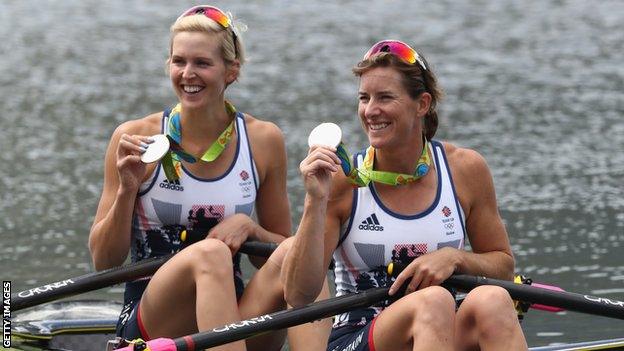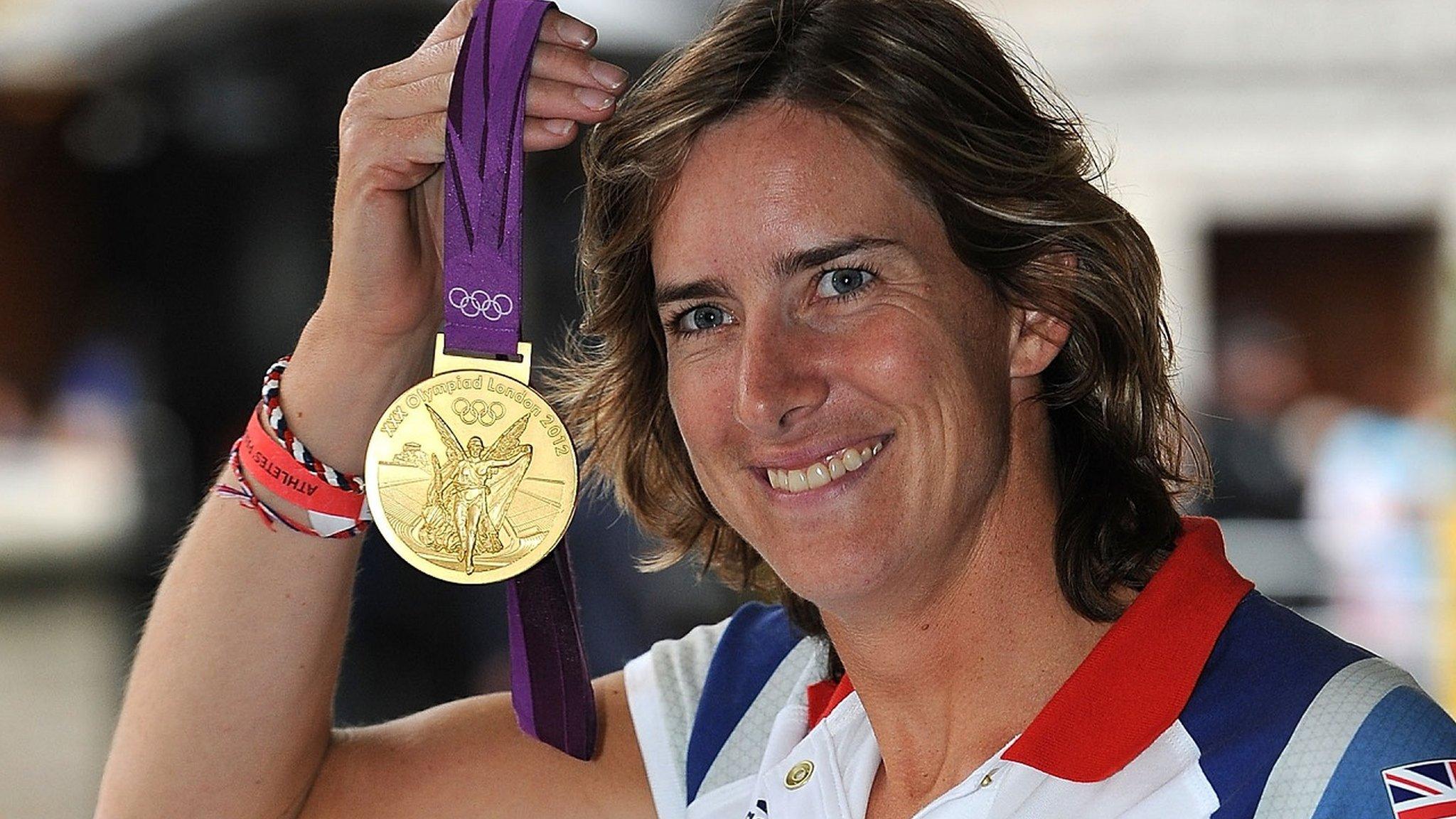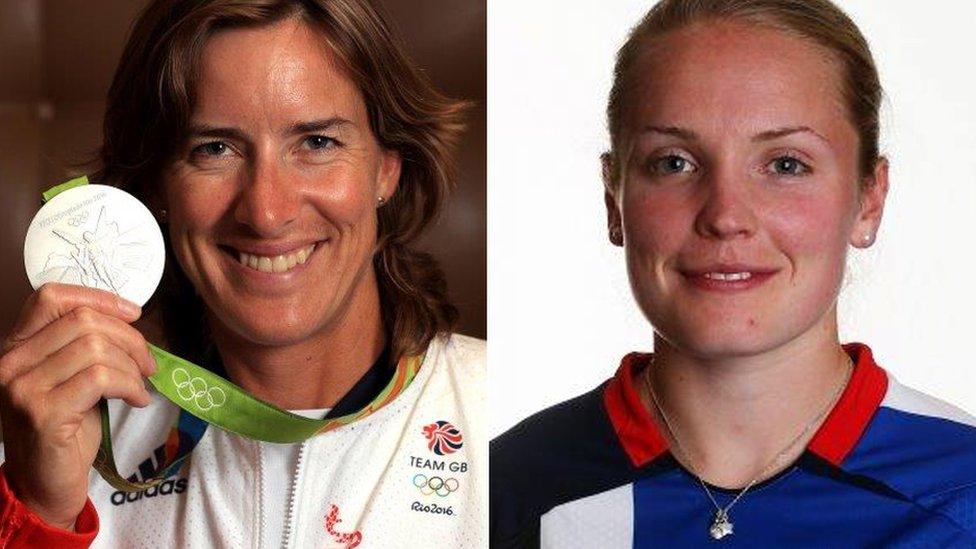Dame Katherine Grainger: Athlete welfare 'huge concern' for UK Sport's incoming chair
- Published
June 2017: Athlete welfare a huge concern - UK Sport chair Grainger
Dame Katherine Grainger, the incoming chair of UK Sport, says she has "huge concerns about athlete welfare".
With a host of governing bodies embroiled in bullying allegations, Grainger told BBC Sport that things "need to improve".
In her first interview since being appointed to one of the most powerful roles in British sport, the former Olympic rower also warned the "risk" of a tougher financial future was another major challenge.
However, the 41 year-old defended UK Sport's 'no-compromise' funding strategy, which allocates money according to medal potential, and has helped transform the country's Olympic and Paralympic fortunes.
"Unfortunately, somehow the message has got out that 'no compromise' could mean 'winning at any costs' and that's not the case," said Grainger, who starts her role on 1 July.
"It's not what anybody who believes in the positive force of sport would want to see."
In a wide-ranging interview, Britain's most decorated female Olympian, who has a PhD in law, said her new role was "a huge privilege and responsibility".
With little experience in sports administration, Grainger was a surprise appointment at such a critical time for UK Sport, but she said: "I was very serious about this job and would not have applied for it if I didn't think I could do it in a very credible way.
"I was honest in the interview and said 'I haven't been a chair of anything like this before'. But I'm very keen to learn, and I've got a lot of incredible support around me."
Financial risk
UK Sport has distributed £345m to 31 Olympic and Paralympic sports in the pursuit of medals at Tokyo 2020.
Lottery funding has revolutionised elite performances over the last 20 years. But with ticket sales declining and the government unlikely to extend Exchequer support after the next summer Games, Grainger warned sports bodies would have to become "much more creative".
"There are a lot of challenges facing British sport right now," she said. "I think everyone is acutely aware of it, nobody is hiding. One of the biggest challenges is financial, and it always will be.
"I think UK Sport has been very well supported by the government and National Lottery for a long time, that's why we've seen such success. But we can't continue to rely on those sources to the extent we have done up until now.
"I think everyone is aware of the risk going forward, and about the fall in lottery ticket sales.
"So all different aspects of the sporting landscape must come together and appreciate the challenge we're all facing."

Grainger (r) is Britain's most decorated female Olympian with five medals, including silver in Rio 2016 with Victoria Thornley
'Awful stories'
After months of negative headlines, it has emerged that a third of UK Sport-funded governing bodies have had to confront athlete welfare issues or complaints, raising fears that medal success has come at the expense of duty of care.
"I don't think anyone in sport doesn't want to see a healthy environment for athletes and all staff," said Grainger.
"From what we've seen it will always need to improve… we are dealing with human beings, and unfortunately in recent months we've seen some awful stories coming to light and nobody wants to see that going on - and I think it is being addressed now.
"I'd like as much out there as possible - I don't want to hear any more negative stories about the culture within sport, but if they exist I want them out on the table because they need to be addressed."
UK Sport has promised a "root and branch review" of culture in high-performance programmes, and appointed a new head of integrity.
When asked if the current controversies amounted to a crisis, Grainger said: "There's huge concerns about athlete welfare without a doubt, and I don't think anyone's pretending it's not, we have to address it.
"For me, it's not about coming and blaming sports, because if there's flaws in the system we have to know how they got there, how do they become avoidable, and it's about learning from any mistakes that have been made," said Grainger.
"Whatever the reasons behind it, these pressures and behaviours now exist and yes, of course we want to stamp them out - but in a way that they won't rise again.
"So if it's a slight shift in education, or understanding what's being asked of people, or the fact that it's not 'win at all costs', then that messaging needs to go out.
"I really want to spend some time with all the sports finding out what challenges they face. And it is a different world we live in now - there are certainly financial pressures on everyone, and has that brought in extra stresses that we may not have predicted 10 years ago?"
Cycling woes
A recent report into claims of bullying at British Cycling, one of the country's most successful and best-funded governing bodies, found a lack of good governance, heard there was "a culture of fear" and criticised UK Sport for missing crucial warning signs.
Grainger said she was "massively disappointed" by the report.
"It's awful to see what some of the athletes and staff have had to go through. None of us would want to see anything like that again. Unfortunately it's happened.
"The scale of it took everyone by surprise. UK Sport has admitted there's things that could have been done differently."
The report was commissioned last year after allegations made by ex-Great Britain cyclist Jess Varnish and Grainger says she would be happy to meet the former sprinter.
"I think everybody would have sympathy with her own situation. You would not want any athlete to go through what she's been through, but I think there has been a lot of change, and as uncomfortable it has been for a lot of people around the sport, it probably has brought change in for the better."
Fantastic ideas
Recommendations aimed at improving athlete welfare have been published by 11-time Paralympic gold medallist Baroness Tanni Grey-Thompson, including a Sports Ombudsman, and a beefed-up British Athletes Commission.
"She has some fantastic ideas," said Grainger.
"At the moment most athletes, if they were in really dire straights, wouldn't always know where to go. That's what I do think we are missing."
When asked if athletes need more employee rights and protection included in their contracts with governing bodies, Grainger said: "You want athletes to feel very protected - but also you want a healthy environment.
"What I don't want is for battle lines to be drawn between sports and their athletes. If things need to change they absolutely should change for the better."
- Published29 June 2017
- Published21 April 2017

- Attribution
- Published14 June 2017
